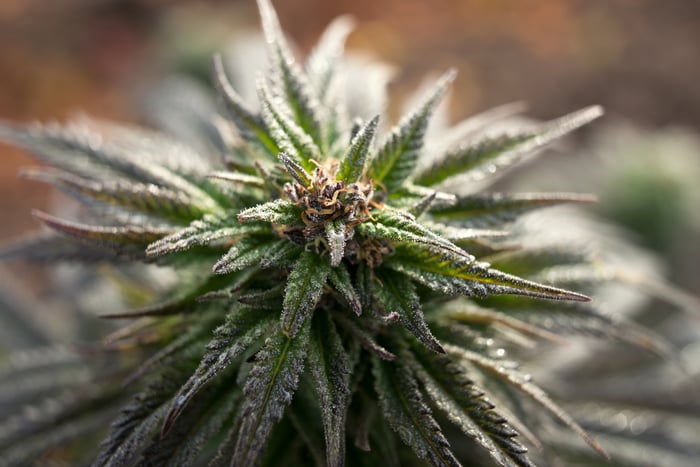If you think the stock market has gone for a wild ride over the past five months, take a closer look at how marijuana stocks have performed over the past couple of years.
Through the first quarter of 2019, investors could have thrown a dart while blindfolded at a list of publicly traded pot stocks and had a good shot at landing a triple-digit return. With tens of billions of dollars in black market weed sales conducted each year, the prospect of steadily moving these sales to legal channels proved more than enough to excite investors.
But since April 2019, cannabis stocks have mostly been mired in a precipitous downtrend. As with all next-big-thing investments, marijuana has hit a period of growing pains. Supply bottlenecks to our north, high tax rates in legal U.S. states, and financing concerns throughout much of North America, have plagued the industry. This has resulted in most pot stocks losing at least 50% of their value, if not more.
Yet, there is hope. As more U.S. states legalize and Canada opens new dispensaries, the expectation is that we'll see the North American cannabis industry steadily blossom. The question is, how best to take advantage of it while still in the early innings? In my view, the top marijuana stock to consider buying in August is U.S. multistate operator (MSO) Trulieve Cannabis (TCNNF -1.52%).

Image source: Getty Images.
Even top marijuana stocks face challenges
While I believe there are a long list of reasons to be excited about Trulieve, I'd first like to address some of the concerns and hurdles the company is likely to encounter. Remember, no matter how perfect a company may appear, there are always challenges to be faced.
Arguably the biggest broad-based hurdle for Trulieve continues to be the U.S. federal government's stance on marijuana. In particular, that's it's a Schedule I (i.e., wholly illicit) substance. Despite two-thirds of the country favoring legalization, according to polls in October 2018 and October 2019 from Gallup, lawmakers have held firm on their unwillingness to legalize medical or recreational marijuana at the federal level.
Although this classification hasn't stopped two-thirds of all states from legalizing medical marijuana in some capacity, it has made accessing traditional forms of financing difficult. This is to say that banks and credit union aren't always willing to offer loans, lines of credit, or even business checking and savings accounts to cannabis companies out of fear of criminal or financial penalty.
Another potential challenge that Trulieve Cannabis investors must be aware of is that Florida is expected to vote on a constitutional amendment to legalize recreational marijuana in November 2022. Trulieve, which has a majority of its dispensaries open in the Sunshine State, may be forced to reestablish its market share if adult-use cannabis is legalized. With competition in Florida having picked up over the past year, there's no guarantee that Trulieve would be able to hang onto (or grow) its existing market share, especially when you consider that adult-use sales typically cannibalize a significant portion of medical weed sales.

Image source: Getty Images.
Here's why Trulieve Cannabis is the pot stock to buy in August
Now that we've had a look at some of the concerns associated with owning Trulieve Cannabis' stock, let me run through the aspects of this company that have me excited.
First of all, there's Trulieve's incredible focus within Florida. Recently, the company opened its 55th dispensary, of which 53 are located in the Sunshine State. Based on Trulieve's own estimate, it controls 51% of Florida's medical marijuana sales. For some context here, the "State of the Legal Cannabis Market" report from Arcview Market Research and BDS Analytics calls for Florida to be the third-highest-selling marijuana state by 2024 -- $1.9 billion a year.
But it's not just Trulieve's market share that's impressive. Despite opening up more than four dozen dispensaries in Florida, Trulieve has been able to keep its marketing and operating expenses reasonably low. This is function of both a fiscally prudent management team, as well as excellent branding power within the Sunshine State. Having such abundant market share and statewide saturation has allowed the company to keep its marketing costs down, which has helped improve profitability.
Speaking of profitability, there isn't a publicly traded marijuana stock in North America that's more profitable on a nominal basis than Trulieve Cannabis. Last year, Trulieve generated $252.8 million in sales, logged $163 million in gross profit, and delivered an operating income after expenses of $86.6 million, all without factoring in one-time benefits and fair-value adjustments. It may not have the highest earnings per share among pure-play pot stocks, but no company is generating a larger nominal profit at the moment.

Image source: Getty Images.
Another consideration here is that cash isn't a concern. Though financing has proved challenging for a number of U.S. pot companies, Trulieve was able to raise a combined $130 million through two debt offerings in 2019, and has undertaken two sale-leaseback agreements to raise cash. With $100.8 million in cash and cash equivalents on its balance sheet to end March 2020, and the company generating healthy operating cash flow, financing isn't something to worry about.
Investors should also realize that recreational pot in Florida could be just as much an opportunity as a risk for Trulieve. Though it may be forced to defend its turf through new licensing, average spending per cannabis patient in the Sunshine State grew 39% in 2019 to $3,900. If medical patients continue to spend more annually on cannabis, and casual consumers can be added on top of that, Trulieve could lose a percentage of its dominant market share and still see its sales grow by a steady double-digit rate.
Finally, there are opportunities for Trulieve beyond Florida. It's acquired its way into three additional markets: California, Massachusetts, and Connecticut. California is the largest marijuana market in the world by annual sales, whereas Massachusetts is expected to become a $1 billion-plus marijuana market within a few years.
If Trulieve simply sticks to its current blueprint and allows its brands to do the talking, it'll remain one of the most nominally profitable marijuana stocks in North America.





